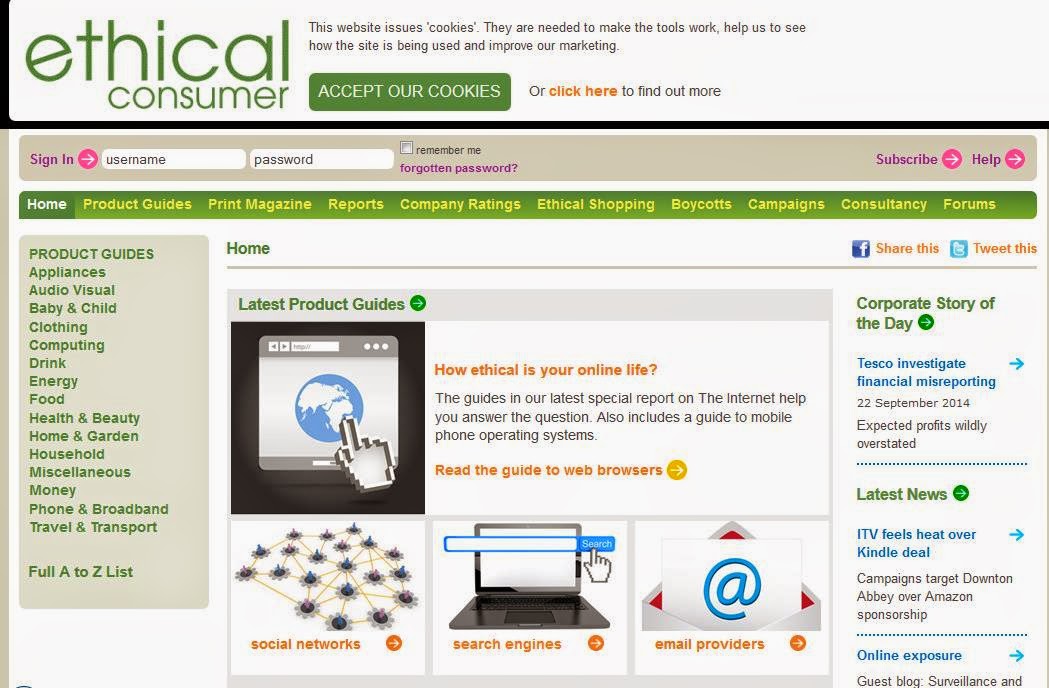Image above: Just one of the many ethical consumerism sites http://www.ethicalconsumer.org/
Contact Malcolm at malcolm.mcinerney@thebartonsc.sa.edu.au
The address for the Socialsense blog
Backgrounding on ...
Ethical consumerism (alternatively called ethical consumption, ethical purchasing, moral purchasing, ethical sourcing, ethical shopping or green consumerism) is a type of consumer activism practiced through 'positive buying' in that ethical products are favoured, or 'moral boycott', that is negative purchasing and company-based purchasing.
The term "ethical consumer", now used generically, was first popularised by the UK magazine the Ethical Consumer, first published in 1989. Ethical Consumer magazine's key innovation was to produce 'ratings tables,' inspired by the criteria-based approach of the then emerging ethical investment movement.
Some links
Human rights and ethical consumerism
The following comes from the ethcial consumer site and involves categorising a range of human rights criteria which can be used to ascertain whether it is ethical to use/buy a product.
1. Oppressive regimes
This includes awareness of companies who have subsidiaries or businesses in countries which we call 'oppressive regimes'. This list of countries was last updated in 2011 using research from Amnesty International, Freedom House and the International Centre for Trade Union Rights. Also taken into account are criticisms relating directly to human rights abuses - such as forcing people off their land to build a pipeline or hiring other agencies which have perpetuated human rights abuses.
· Abuse of the Land rights of existing residents
· All company's products are fair trade
· Banking, investment or other financial services relationship with a company criticised in this category
· Company self-disclosure of a Human Rights incident
· Discrimination on grounds of age, gender, sexuality, race, ethnicity, creed, disability, class or caste or disability
· human rights abuses
· Human rights abuses perpetrated by military/security forces and/or government hired by company
· Involved in infringements of civil rights (eg ID cards in non-oppressive regimes)
· Involvement in projects with links to human rights abuses
· Non disclosure of country of origin in sector where sourcing from oppressive regimes is common
· companies can also pick up marks for operations in oppressive regimes
· Positive policy addressing a human rights issue
· Publisher or distributor of pornography
· Sourcing from illegally state-occupied territory
· Suppression of freedom of speech
· Use of palm oil with no effective remediation strategy
2. Abuse of workers’ rights by the manufacturer
· Aggravated - provision of an inadequate or dangerous working environment
· Intimidation of workers by management (including dismissal for strike action)
· Banking, investment or other financial services relationship with a company criticised in this category
· Payment of wages below that necessary for an adequate living
· Company self-disclosure of an incident in this category
· Positive policy addressing a workers' rights issue
· Denial of right to associate, unionise or bargain collectively
· Provision of an inadequate or dangerous working environment
· Discrimination by employers on grounds of race, sex, sexuality, age, creed, caste or disability
· Retails cotton products but no cotton sourcing policy, ie avoiding Uzbek cotton due to child labour
· Enforcement by a company of a working week over 48 hours
· Enforcement of forced or excessive overtime
· Enforcements of excessive or unjustified penalties (fines etc) on workers.
· Supply chain policy exploitative use of child labour serious criticism or fine from government Health & Safety body Harassment (Inc sexual harassment) or bullying of workforce.
· Use of forced or slave labour
· Use of Prison Labour
3. Association with Arms & Military Supply
This not only includes companies that supply weaponry to the armed forces, but also those supplying any goods or services to the armed forces (though the severity of the rating is different!).
4. Irresponsible Marketing
· Companies that have marketed their products in a way that has been criticised for causing physical harm, or is detrimental to health. The most famous company that has consistently been criticised in this area is Nestle which has been criticised for the way that it markets its baby milk products.
· Other examples of irresponsible marketing include drug companies which have been criticised for putting products on the market even after negative results.
Check out the ethical ratings for companies and choose a product to focus on for your advertising campaign.
There is also an Ethical Consumerism Guide.
Remember your focus for this assignment is on human rights and not about environmental ethical consumerism etc.

No comments:
Post a Comment